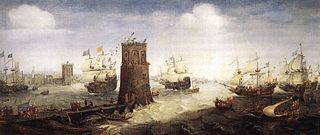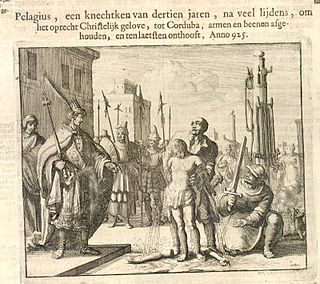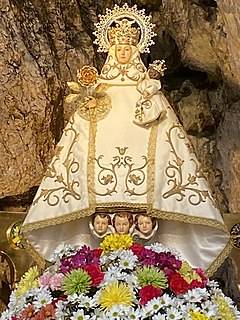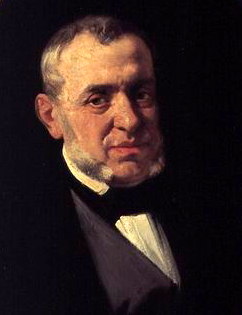Notes
- ↑ St. Hermogius Catholic Online
Saint Hermogius | |
|---|---|
| Born | Tui, Spain |
| Died | 942 Ribas del Sil |
| Venerated in | Roman Catholic Church |
| Feast | 26 June |
| Attributes | Benedictine |
Hermogius was a Benedictine bishop, and uncle to Pelagius of Cordova.
Born at Tui, Spain, Hermogius founded Labrugia Monastery in Spanish Galicia in 915. [1] Shortly afterwards he was taken prisoner by the Moors after their recent conquest of the area. Hermogius was released when his nephew, Pelagius took his place as a hostage for the Moors. Pelagius would later suffer death as a martyr, with Hermogius retreating to Ribas del Sil, where he would eventually die, in 942.
Pelagianism is a heterodox Christian theological position that holds that the original sin did not taint human nature and that humans have the free will to achieve human perfection without divine grace. Pelagius, a British ascetic and philosopher, taught that God could not command believers to do the impossible, and therefore it must be possible to satisfy all divine commandments. He also taught that it was unjust to punish one person for the sins of another; therefore, infants are born blameless. Pelagius accepted no excuse for sinful behavior and taught that all Christians, regardless of their station in life, should live unimpeachable, sinless lives.

The Reconquista was a period in the history of the Iberian Peninsula of about 781 years between the Umayyad conquest of Hispania in 711, the expansion of the Christian kingdoms throughout Hispania, and the fall of the Nasrid kingdom of Granada in 1492.

The term Moor is an exonym first used by Christian Europeans to designate the Muslim inhabitants of the Maghreb, the Iberian Peninsula, Sicily and Malta during the Middle Ages. The Moors initially were the indigenous Maghrebine Berbers. The name was later also applied to Arabs and Arabized Iberians.

Pelagius was a Hispano-Visigoth nobleman who founded the Kingdom of Asturias in 718. Pelagius is credited with initiating the Reconquista, the Christian reconquest of the Iberian Peninsula from the Moors, and establishing the Asturian monarchy, making him the forefather of all the future Iberian monarchies, including the Kings of Castile, the Kings of León, and the Kings of Portugal.

The Battle of Covadonga was a battle that took place in 718 or 722 between the army of Pelagius the Visigoth and the army of the Umayyad Caliphate. Fought near Covadonga in the Picos de Europa, either in 718 or 722, it resulted in a victory for the forces of Pelagius. It is traditionally regarded as the foundational event of the Kingdom of Asturias and thus the initial point of the Christian Reconquista ("reconquest") of Spain after the Umayyad conquest of 711.

The Kingdom of Asturias was a kingdom in the Iberian Peninsula founded by the Visigothic nobleman Pelagius. It was the first Christian political entity established after the Umayyad conquest of Visigothic Hispania in 718 or 722. That year, Pelagius defeated an Umayyad army at the Battle of Covadonga, in what is usually regarded as the beginning of the Reconquista.
Pope Pelagius I was the bishop of Rome from 556 to his death. A former apocrisiarius to Constantinople, Pelagius I was elected pope as the candidate of Emperor Justinian I, a designation not well received in the Western Church. Before his papacy, he opposed Justinian's efforts to condemn the "Three Chapters" in order to reconcile theological factions within the Church, but later adopted Justinian's position.
Pope Pelagius II was the bishop of Rome from 26 November 579 to his death.
Alfonso I of Asturias, called the Catholic, was the third King of Asturias, reigning from 739 to his death in 757. His reign saw an extension of the Christian domain of Asturias, reconquering Galicia and León.

Pelagius was a British monk and theologian, his theological system is known as Pelagianism, which emphasized human choice in salvation. Pelagius and his followers abhorred the moral standards of Christians in Rome, which he blamed on the view of divine grace. Pelagius was accused of heresy at the synod of Jerusalem in 415 and his doctrines were harshly criticized by Augustine of Hippo, especially the Pelagian views about humankind's good nature and individual responsibility for choosing ascetism. Pelagius especially stressed the freedom of human will. Very little is known about the personal life and the career of Pelagius.

The Fifth Crusade (1217–1221) was a campaign by Western Europeans to reacquire Jerusalem and the rest of the Holy Land by first conquering Egypt, ruled by the powerful Ayyubid sultanate, led by al-Adil, brother of Saladin.

The flag of Asturias shows the "Cruz de la Victoria" in yellow over blue.
Caelestius was the major follower of the Christian teacher Pelagius and the Christian doctrine of Pelagianism, which was opposed to Augustine of Hippo and his doctrine in original sin, and was later declared to be heresy.

Pelagius of Córdoba was a Christian boy who died as a martyr in Córdoba in southern Spain around 926 AD.
Pelagio Galvani was a Leonese cardinal, and canon lawyer. He became a papal legate and leader of the Fifth Crusade.

Pelagiusof Oviedo was a medieval ecclesiastic, historian, and forger who served the Diocese of Oviedo as an auxiliary bishop from 1098 and as bishop from 1102 until his deposition in 1130 and again from 1142 to 1143. He was an active and independent-minded prelate, who zealously defended the privileges and prestige of his diocese. During his episcopal tenure he oversaw the most productive scriptorium in Spain, which produced the vast Corpus Pelagianum, to which Pelagius contributed his own Chronicon regum Legionensium. His work as a historian is generally reliable, but for the forged, interpolated, and otherwise skillfully altered documents that emanated from his office he has been called el Fabulador and the "prince of falsifiers". It has been suggested that a monument be built in his honour in Oviedo.

Our Lady of Covadonga also named "La Santina" is a title of the Blessed Virgin Mary and the name of a Marian shrine devoted to her at Covadonga, Asturias. The shrine in northwestern Spain rose to prominence following the Battle of Covadonga in about 720, which was the first defeat of the Moors during their invasion of Spain. A statue of the Virgin Mary, hidden in one of the caves, was believed to have miraculously aided the Christian victory.

The Santa Cueva de Nuestra Señora de Covadonga is a Catholic sanctuary located in Asturias, northern Spain. It is a cave in the Picos de Europa mountains, which gives its name to the parish of Covadonga in the municipality of Cangas de Onís. The name refers to the sanctuary, dedicated to the Virgin of Covadonga, where the first batlle of the Spanish Reconquest took place in 718.

The Portuguese House of Burgundy or the Afonsine Dynasty was a Portuguese dynasty that ruled the Kingdom of Portugal from its founding until the 1383-85 Portuguese Interregnum.

Pelagio is an opera in four acts by Saverio Mercadante. The Italian-language libretto was by Marco D'Arienzo. It premiered on 12 February 1857 at the Teatro San Carlo, Naples, to great success.